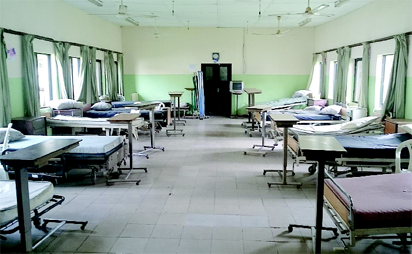Nigeria’s health sector, like in many other developing nations, has recorded many successes and challenges since independence in 1960. At independence, Nigeria had an effective healthcare delivery system in such a way that the health sector attracted notable personalities from abroad to seek healthcare at the University College Hospital, Ibadan in southwest Nigeria.
However, the country’s healthcare sector experienced decline over the years especially with issues like underfunding, inadequate infrastructure, and limited access to healthcare that slowed its progress.
Some of the reasons include poor allocations to the health sector, lack of coordinated regulation, and training gap from the health practitioners contributed to the downward trend in the sector, leading to reliance on out-of-pocket payments for health services access by citizens.
The years of neglect of the healthcare sector also resulted to inadequate infrastructure; outdated medical equipment and an inability to move with trends in research and development in medicine and healthcare delivery. There is also the challenge of low motivation of health workers and the brain drain that deprived Nigeria of some of its best brains in the medical field resulting to medical tourism costing Nigeria about $2 billion annually.
Despite these challenges, there are prospects for improvement in the health delivery system with the introduction of policies aimed at meeting the Universal Health Coverage (UCH) targets.
The Nigerian health sector has through healthcare reform initiatives by past governments many public health challenges were addressed and improved health care indicators are being recorded in Nigeria. The National Health Promotion Policy (NHPP) of 2006 was targeted at improving the health management capacity of institutions.
The National Health Act of 2014 provided for regulations that integrated all public and private health services structures by establishing the National Health System that set standards for rendering services in Nigeria.
President Bola Ahmed Tinubu’s administration has made significant efforts to improve the Nigerian health sector. These include increasing recruitment and remuneration of health workers, promoting the local production of medical supplies, and upgrading medical facilities across the country.
Nigeria’s Minister of Health and Social Welfare, Professor Ali Pate, commissioned new facilities at the Nnamdi Azikiwe Teaching Hospital, Awka, Anambra State, Southeast Nigeria, towards improving the training of healthcare personnel and improved service delivery.
In December 2023, President Tinubu launched Nigeria’s Health Sector Renewal Compact, a partnership between the Federal government, the 36 state governments, and development partners. A key goal of the renewed compact is to increase health insurance coverage from the current seven million to fifty million people within three years in Nigeria.
There is no denying that increased funding at all levels of health services will leverage the health sector and accelerate the universal health coverage targets in Nigeria. Other low-hanging fruits could be agreements reached with developed countries and private sector investments in the healthcare sector.
Efforts should also be directed toward mitigating the negative effects of economic policies on healthcare access, especially the need for the government to prioritize affordable healthcare for the poorest populations.
Special incentives to attract private sector funding, tapping into public resources such as legislators’ constituency project funds, and full implementation of the National Health Insurance Authority Act (NHIAA) are required to improve the access and UHC objectives in Nigeria.
The Tertiary Education Trust Fund (TETFund) recently approved N8.5 billion for medical research, a 13.33% increase to boost local research capacity and informed policy decisions to would enhance the country’s ability to address imaging health challenges. Strengthening diagnostics and surveillance systems will also improve Nigeria’s ability to prevent and respond to public health emergencies.
There is also the need to address social determinants such as child nutrition, environmental pollution, family planning, and access to safe drinking water necessary for improved public health.
Nigeria’s healthcare sector requires urgent attention. By addressing the challenges, and implementing necessary reforms, Nigeria can strengthen its healthcare system to meet international standards. The Tinubu administration’s efforts demonstrate a commitment to reform, but sustained action and collaboration among stakeholders are essential to transforming Nigeria’s healthcare sector and improving the universal health coverage (UHC) in the country.


Comments are closed.